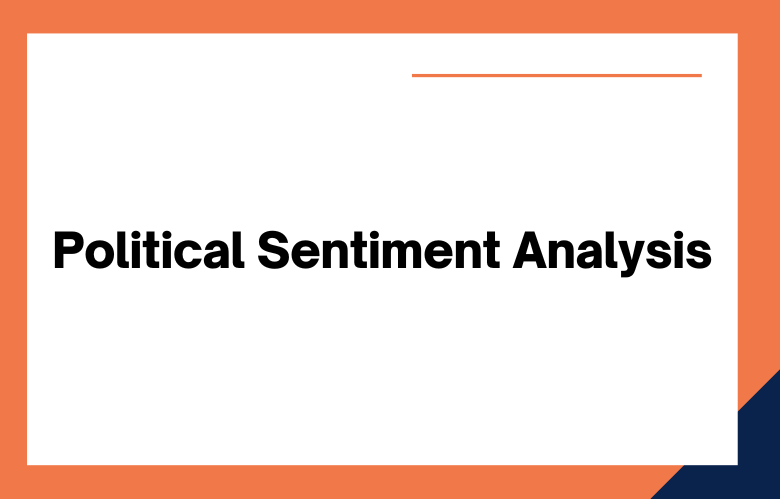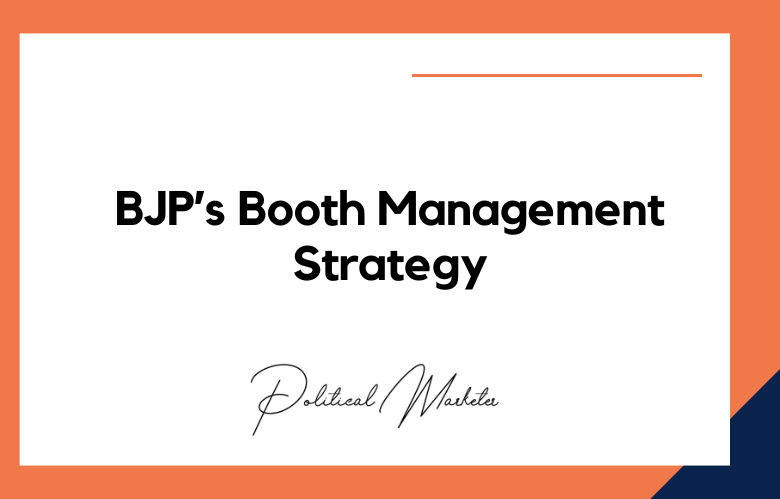Politics and sentiment go hand in hand these days. The ability to gauge the mood of constituents has always been more important for political leaders, especially with the rise of social media.
Sentiment analysis is a powerful tool that uses natural language processing and text analysis techniques to understand the emotions and opinions expressed in online conversations, including social media.
I will explore why sentiment analysis is essential for political leaders.
Firstly, sentiment analysis provides politicians with a clear insight into the concerns of their constituents.
Analyzing social media conversations can help politicians understand what matters most to their constituents and, therefore, shape their policies to better align with their priorities.
For example, political leaders can use sentiment analysis to identify the most discussed issues in their constituency, understand what people think about them, and work towards resolving them based on that feedback.
What is Sentiment Analysis for Political Leaders?
Sentiment analysis is a technique that analyzes text data to identify and categorize the sentiment behind it.
This technique uses machine learning algorithms to discover a text’s emotional responses, opinions, and attitudes.
In political analysis, sentiment analysis can provide valuable insights into public opinion by identifying trends, issues, and demographics influencing the political climate and public opinion.
How Can Sentiment Analysis Help Political Leaders Connect with Their Audience
As the world becomes increasingly digitized, the importance of technology in politics cannot be overstated.
One such technological innovation that has garnered much attention in recent years is sentiment analysis.
At its core, sentiment analysis uses algorithms and automated tools to identify, extract, and quantify subjective information from text data, such as social media posts, online reviews, and news articles.
We will explore how political leaders can use sentiment analysis to connect with their audience better.
The Importance of Sentiment Analysis in Politics
In today’s digital age, political leaders cannot ignore the power of social media and online communication.
Public opinions and sentiments can be shared and amplified within seconds, making it crucial for politicians to pay attention to what people say about them and their policies.
This is where sentiment analysis comes into play. By analyzing social media and online conversations, sentiment analysis can provide insights into the public’s opinion and help political leaders make informed decisions. I will discuss why sentiment analysis is essential for political leaders.
The Significance of Sentiment Analysis in Today’s Politics
Politics has always been a sensitive topic, becoming more volatile than ever in the internet age.
Social media has given everyone a voice, making it hard for politicians to keep their fingers on the pulse of the public.
But what if you could analyze all that social media data and use it to understand how people feel about your policies, speeches, and even your character as a candidate?
That’s where sentiment analysis comes in, quickly becoming an essential tool for political leaders and campaign strategists.
Understanding the Importance of Sentiment Analysis for Political Leaders
In today’s world, political leaders constantly engage with the public via various channels such as social media, speeches, and press conferences.
To be successful in their political endeavors, leaders must be able to gauge the sentiment of the public and adapt their strategies accordingly.
This is where sentiment analysis comes into play, as it can help leaders derive valuable insights from social data that can guide their decision-making and help them stay ahead of the curve.
The Limitations of Sentiment Analysis:
It’s essential to remember that sentiment analysis has its limitations. It could be a better tool, and it’s only sometimes accurate.
For example, it can struggle to identify sarcasm or detect heavily coded language. Sentiment analysis may need to capture the nuances of political issues or the complexity of public opinion.
Therefore, it should be part of a broader set of analytics tools to gain a more nuanced understanding of public sentiment.
Understanding Public Opinion:
Social media and online communication provide a platform for citizens to share their opinions and thoughts.
By monitoring these conversations, political leaders can understand the public’s opinion about their policies, political opponents, and current events.
Sentiment analysis can help identify positive and negative sentiments, as well as the intensity and frequency of these sentiments.
This information can be used to adjust messaging and policies to better align with the public’s stance. By understanding how the public feels, political leaders can take steps to engage with their constituents and build stronger relationships.
Crisis Management:
In politics, a single tweet or social media post can quickly escalate into a crisis. Sentiment analysis can help political leaders identify and respond to these situations before they escalate.
By monitoring social media sentiment and online conversations, political leaders can quickly detect when public opinion turns negative and take measures to mitigate any damage.
By responding quickly and transparently, political leaders can show they are listening to constituents and take steps to resolve any issues before they become major crises.
Reaching Constituents:
Social media and online communication provide a direct line to constituents. Political leaders can use sentiment analysis to identify influential individuals and groups within their constituency, understand their concerns and interests, and tailor their messaging.
Sentiment analysis can also help political leaders identify potential allies and partners within their constituency, improving their effectiveness in engaging with and representing their constituents.
Competitive Analysis:
In politics, understanding the competition is essential. Sentiment analysis can help political leaders understand the public’s opinion of their opponents.
By monitoring social media sentiment and online conversations about their opponents, political leaders can identify their strengths and weaknesses and adjust their messaging to differentiate their policies from those of their opponents.
This knowledge can be invaluable in elections and other political campaigns.
Policy Development:
Sentiment analysis can also help political leaders develop policies aligned with the public’s values and interests.
By understanding the sentiment of social media and online conversations, political leaders can identify critical issues for the public and create policies that reflect their concerns.
This approach can lead to policies that enjoy widespread support and help political leaders build closer relationships with their constituencies.
Conclusion:
Sentiment analysis is an invaluable tool for politics. Understanding constituents’ emotions and opinions offers a powerful platform for political leaders to shape their policies, monitor their reputation, keep up with public statements, plan their political campaigns, and personalize their communication with their followers.
With the right tools and techniques, sentiment analysis can help political leaders stay ahead, win supporters, and more effectively fulfill their mandate.
Call: +91 9848321284
Email: [email protected]
Frequently Asked Questions (FAQs)
What is sentiment analysis in the context of politics?
Sentiment analysis is the use of natural language processing and AI to evaluate and categorize public opinions expressed through text data, helping political leaders gauge public sentiment on issues, speeches, or policies.
Why is sentiment analysis important for political leaders?
It helps leaders understand how their messages are perceived, identify voter concerns, and make informed decisions based on emotional tone and public reaction.
How does sentiment analysis help in campaign strategy?
By identifying what resonates or causes backlash among voters, leaders can refine messaging, adjust priorities, and allocate resources effectively during campaigns.
Which platforms are most commonly analyzed for political sentiment?
Social media platforms like Twitter, Facebook, Instagram, YouTube comments, Reddit, news comments, and blogs are frequently used due to high engagement and volume of opinions.
What types of sentiment are usually tracked?
Typically, sentiments are classified as positive, negative, or neutral. Advanced tools also detect emotions like anger, joy, fear, or trust.
How is AI used in sentiment analysis for political purposes?
AI automates the collection and interpretation of public data, providing real-time dashboards, trend monitoring, and emotional scoring on topics or political figures.
What role does sentiment analysis play in crisis management?
It allows leaders to detect rising negativity or misinformation early, enabling quick response strategies to protect reputation and rebuild trust.
Can sentiment analysis predict election outcomes?
While not definitive, it offers valuable signals on public mood and issue salience, complementing traditional polling data for forecasting.
How do political parties use sentiment trends?
They monitor shifts in voter mood, test policy reactions, and identify regions or demographics requiring attention or campaign intensification.
Is sentiment analysis useful for speechwriters and communication teams?
Yes, it provides insights into language that resonates, framing preferences, and emotional triggers that influence audience reception.
How does real-time sentiment monitoring support political decision-making?
Leaders can instantly understand public reaction to new announcements or controversies and adjust accordingly to avoid further damage or capitalize on approval.
What are some tools used for political sentiment analysis?
Popular tools include Brandwatch, Talkwalker, MonkeyLearn, Lexalytics, and custom NLP models built using Python or platforms like IBM Watson or Google Cloud NLP.
Are there challenges in analyzing multilingual sentiment?
Yes, nuances, idioms, and cultural expressions vary across languages, requiring localized models or native-language datasets to ensure accuracy.
How accurate is sentiment analysis in understanding public opinion?
Accuracy depends on data quality, algorithm training, context understanding, and noise reduction; human validation often improves interpretation.
Can sentiment analysis be used for influencer and media monitoring?
Yes, it helps identify key opinion leaders, track how media outlets portray a politician, and evaluate the tone of coverage or endorsements.
What is the difference between sentiment analysis and social listening?
Sentiment analysis focuses on emotional tone in text, while social listening also tracks volume, keywords, mentions, and broader trends.
How can sentiment analysis support grassroots political movements?
Movements can use sentiment insights to refine calls to action, identify emotional pain points, and amplify supporter voices effectively.
Do governments use sentiment analysis for policy evaluation?
Yes, many governments and policymakers use it to understand public feedback on policy implementations, proposed bills, or administrative performance.
How can political leaders ensure ethical use of sentiment data?
By maintaining data privacy, transparency in AI use, and avoiding manipulative tactics, leaders can build trust while benefiting from insights.
What’s the future of sentiment analysis in politics?
The future includes emotion-aware AI, multimodal analysis (voice, video, text), predictive modeling, and integration with digital town halls and AI chatbots for public feedback.











